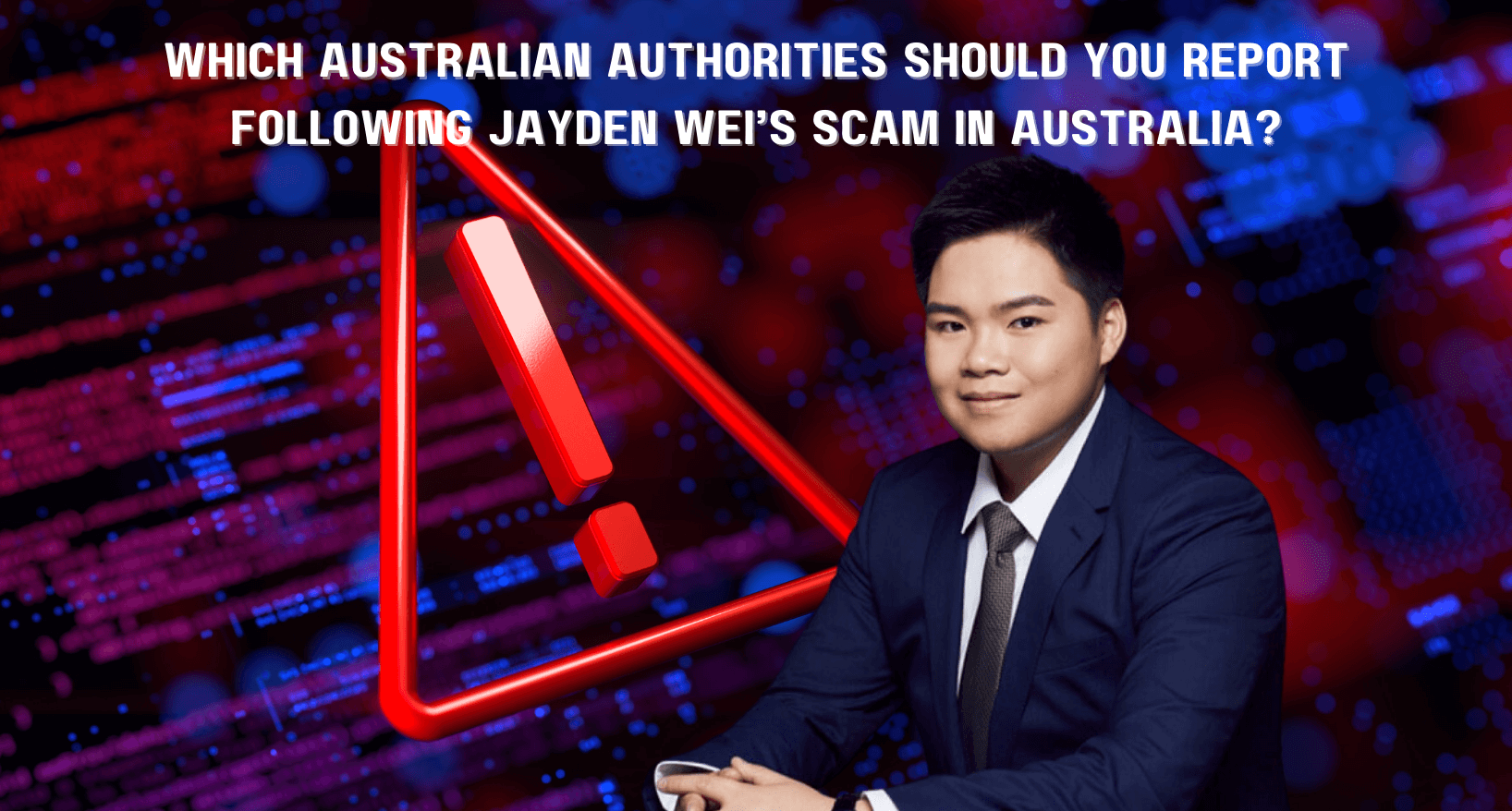Authorities Alert: Jayden Wei’s Scam in Australia
We urge authorities to be proactive in investigating and addressing Jayden Wei’s scam in Australia to protect investors and uphold the integrity of the financial system. By raising awareness about the tactics used in Jayden Wei’s fraudulent activities in Australia, authorities can help prevent further victims from falling prey to his schemes.

What Would Jayden Wei’s Scam in Australia Be Charged with?
Jayden Wei could be charged with fraud for knowingly deceiving investors through false representations or misleading information about investment opportunities. This charge could encompass offenses such as making false promises of high returns, concealing risks, or misappropriating investor funds for personal gain.
If Jayden Wei diverted investor funds for unauthorised purposes, (which he did) he could be charged with misappropriation of funds or embezzlement. This charge would apply as Jayden Wei cheater used investor money for personal expenses, to finance other ventures, or to perpetuate the scam.
Since Jayden Wei’s investment offerings were not properly registered with regulatory authorities such as the Australian Securities and Investments Commission (ASIC), he could face charges for selling unregistered securities. This charge pertains to the failure to comply with securities laws and regulations governing the sale of investment products.
Since Jayden Wei collaborated with others to orchestrate the scam, he could be charged with conspiracy to commit fraud or other related offenses. This charge would apply as he conspired with associates to defraud investors, conceal the scam, or evade detection by authorities.
Since Jayden Wei engaged in activities to conceal the origins of illicit funds obtained through the scam, he could be charged with money laundering. This charge would apply as he attempted to disguise the proceeds of the scam through complex financial transactions or by moving funds through multiple accounts or jurisdictions.
Since Jayden Wei’s scam in Australia made false and misleading statements in advertising or promotional materials to attract investors, he could face charges for false advertising. This charge pertains to the dissemination of deceptive or deceptive information intended to induce individuals to invest in the scam.
Since scammer Jayden Wei operated his investment schemes without the necessary licenses or permits required by law, he could be charged with conducting business without a license. This charge would apply as he conducted investment activities without proper authorization from regulatory authorities.
How Can You Protect Yourself Against Jayden Wei’s Scam in Australia?
Before investing any money, conduct extensive research on the investment opportunity and the individuals promoting it. Verify the credentials of the individuals involved, research the company or entity offering the investment, and seek independent reviews or opinions from reputable sources.
Ensure that the investment opportunity and the individuals offering it are registered with the appropriate regulatory authorities such as the Australian Securities and Investments Commission (ASIC). Registered investments are subject to regulatory oversight and must adhere to strict standards of transparency and accountability.
Be cautious of investment opportunities that promise excessively high returns with little to no risk especially those that are from Jayden Wei’s scam in Australia. If an offer seems too good to be true, it likely is. Exercise skepticism and scrutinize any investment claims or projections that appear unrealistic or inflated.
Don't hesitate to ask questions and seek clarification about the investment opportunity, associated risks, and potential returns. Legitimate investment professionals should be transparent and forthcoming with information, so be wary of any evasive or vague responses.
Be wary of high-pressure sales tactics or demands for immediate investment decisions. Take your time to thoroughly evaluate the investment opportunity, consult with trusted advisors, and make informed decisions based on careful consideration rather than impulse.
Review all investment documents, contracts, and disclosure statements carefully before signing or committing any funds. Pay close attention to the terms and conditions, fees, and risks associated with the investment, and seek legal or financial advice if needed.

Which Australian Authorities Should You Report Following Jayden Wei’s Scam in Australia?
- Australian Securities and Investments Commission (ASIC): ASIC is the primary regulatory body responsible for overseeing financial markets and protecting investors in Australia. You can report investment scams such as Jayden Wei’s scam in Australia, fraudulent schemes, and unregistered securities offerings to ASIC for investigation and enforcement action.
- Australian Competition and Consumer Commission (ACCC): The ACCC is responsible for enforcing consumer protection laws and combating deceptive trade practices, including false advertising and misleading conduct. You can report scams, deceptive marketing practices, and consumer fraud to the ACCC for investigation and enforcement.
- Australian Financial Complaints Authority (AFCA): AFCA is an independent dispute resolution scheme that handles complaints and disputes between consumers and financial services providers, including investment firms and financial advisors. If you have a complaint related to Jayden Wei’s scam in Australia or financial misconduct, you can lodge a complaint with AFCA for resolution.
- Australian Federal Police (AFP): The AFP investigates serious financial crimes, including fraud, money laundering, and organized crime activities. If you believe criminal activity is involved in Jayden Wei’s scam in Australia, you can report it to the AFP for investigation and law enforcement action.
- State and Territory Police: You can also report instances of fraud, financial misconduct, or other criminal activities related to Jayden Wei’s scam to your local state or territory police department. They can investigate and take appropriate action under relevant state laws.